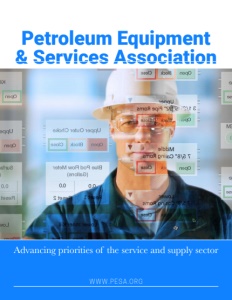Petroleum Equipment & Services Association
Advancing priorities of the service and supply sector
Business View Magazine interviews Tim Tarpley of PESA, as part of our focus on best practices of the energy industry’s service and equipment organizations.
The Petroleum Equipment & Services Association (PESA) is the unified voice for the energy industry’s services and equipment organizations, advocating for, and supporting, this sector’s achievements in job creation, technological innovation, and economic stability. Founded in 1933 as the American Petroleum Equipment Suppliers Association, its role, then, was to assist the federal government in preparing a fair practice code for the oilfield equipment industry. With that objective accomplished, the Association’s charter members realized the value of keeping it intact as a trade association.
Today, PESA’s more than 200 companies represent a diverse global workforce of 1.3 million. And according to Tim Tarpley, PESA’s Vice President for Government Affairs, the organization’s membership is very diverse. “We have everything from huge, multi-national companies down to smaller forgers that have 30 or 40 employees and are producing small parts for the oilfield,” he reports. “Directly, in our sector, we support 600,000 jobs all over the United States. And these are high-skilled, high-paying jobs that help support communities all over the country. We also have two international chapters – one in the Middle East, and we just opened one in Argentina. These chapters provide support for our companies that are operating in those regions. We also help companies enter those new markets. That’s a big value-add for our companies, as well, because, often, when operating in an area where they might not have operated before, our support is helpful.”

PESA’s ongoing work is embodied in its mantra: “Train, Elevate, Network,” which translates into a broad range of programs and services that are focused on workforce development, advocacy, and business intelligence. Another priority for PESA is to advance the views of the oilfield service sector. PESA works to engage with policymakers on legislation and regulations that impact the safety and vitality of the energy industry. In addition, PESA promotes the technology innovations of PESA member companies who develop the tools and technology to harness the world’s natural resources safely, more efficiently, and with a smaller environmental footprint.
Another valuable service that underpins all PESA events, programs, and activities is the opportunity to network across the supply chain, with key customers, and with industry thought leaders. In addition to building relationships with colleagues and clients, events are focused on keeping members up-to-date with trends and issues impacting the industry. “We have multiple events throughout the year,” says Tarpley. “We have a DC fly-in in February; we have an annual meeting in April; and we have dozens of regional, district, and international chapter meetings throughout the year.”
Training is a big part of PESA’s agenda. “It would be difficult for individual companies to organize the kind of training that we put together,” Tarpley explains. “We do Oil and Gas 101, which is an intro to the oil and gas industry and we teach this course multiple times throughout the year. A majority of those students are member-company employees who are new hires or perhaps they worked in one sector of the company where they didn’t need to have much industry knowledge, but moved into a new section where they do need that knowledge. So, it’s a great way for them to get that training.” PESA also has a long-term contract with the U.S. Department of State to train its Foreign Service officers before they are deployed to an energy-intensive country.
Another valuable program offered by PESA is its Credit Interchange Division (CID), a cooperative venture among PESA member companies that facilitates the confidential exchange of up-to-date ledger experience among its member companies and divisions. CID currently maintains a database of more than 300,000 ledger entries on nearly 50,000 existing and potential customers. “If they choose to participate, members can check out the creditworthiness of other companies they might want to do business with,” Tarpley notes. “Many of our companies are members solely because of that program.”

Current topics on PESA’s agenda include analyzing how the new United States-Mexico-Canada Trade Agreement (USMCA) is going to affect its members, and how companies can upgrade their ESG scores. ESG, or Environmental, Social, and Governance, refers to the three central factors in measuring the sustainability and societal impact of an investment in a company or business. These criteria help to better determine their future financial performance.
“Money is not flowing into the sector quite as easily as it once did.” Tarpley explains. “A lot of investors are only investing in companies that they feel meet certain ESG thresholds. Some of the big investor funds don’t invest in oil and gas, at all, or if they do, it’s only in companies that meet certain scores. So, what we’re really focusing a lot on, this year, is to train our companies on how to improve what they do, how to behave in an environmentally-responsible way, and how to handle their board and hiring in a positive, progressive way. Ultimately, the goal is to have them improve their score.”
Tarpley adds that PESA also advocates that its member companies continue to employ technologies that make the production of oil and gas cleaner and more efficient, while simultaneously promoting those technologies for use in the renewable energy sector. “Our companies produce technology and have expertise that can be used in the creation of energy however it’s done,” he remarks. “Right now, in the U.S. and around the world, oil and gas is, by far, the dominant source of energy, and we think there’s going to be tremendous growth in Africa and Southeast Asia, especially, that’s going to drive that growth for a while. However, our goal is to have our companies provide the technology to produce energy in whatever is the most efficient and economically sensible way to do it. For many years, there’s been this perception that it’s oil and gas versus renewables, versus nuclear, and that’s not how we see it. We see it as how we’re going to produce energy the world needs and how we’re going to do it in the best way possible. That’s what many of our companies have already moved toward, and we see that trend continuing.”
“And those technologies that our companies create is an American success story,” Tarpley adds, in conclusion. “The United States has always led in this sector, and we expect to lead in this sector for years to come. The equipment and technologies that these companies develop and build is not only used in the United States to extract and provide energy in the United States; it’s exported all over the world. And any company that is working in this sector, anywhere in the world, knows that these companies are the best.”
AT A GLANCE
WHO: Petroleum Equipment & Services Association
WHAT: A trade association representing the energy industry’s services and equipment organizations
WHERE: Houston, Texas
WEBSITE: www.pesa.org



